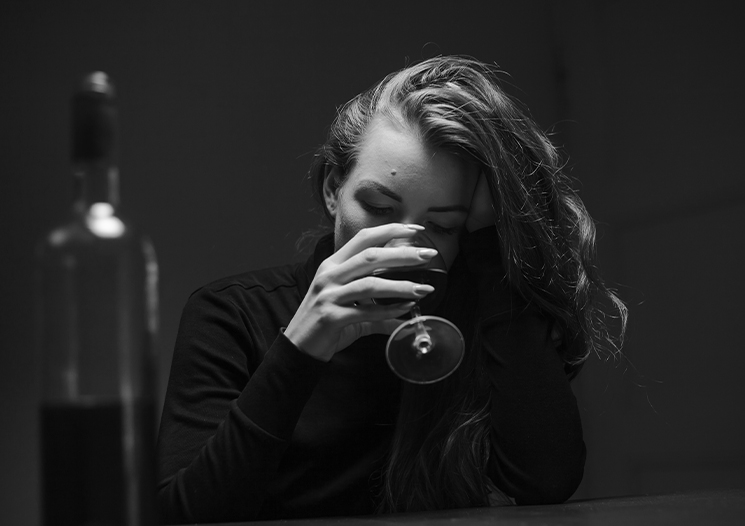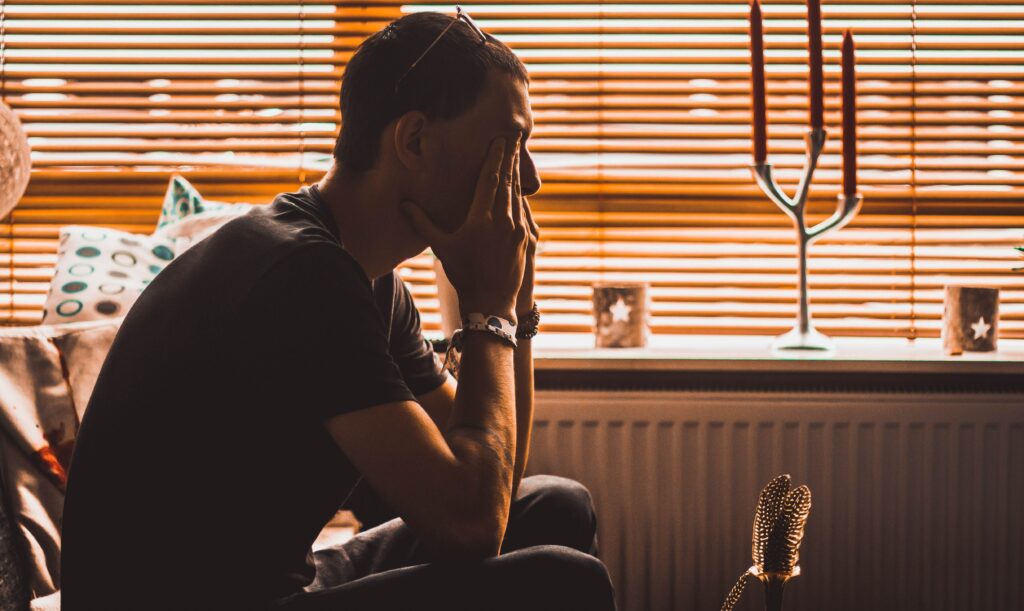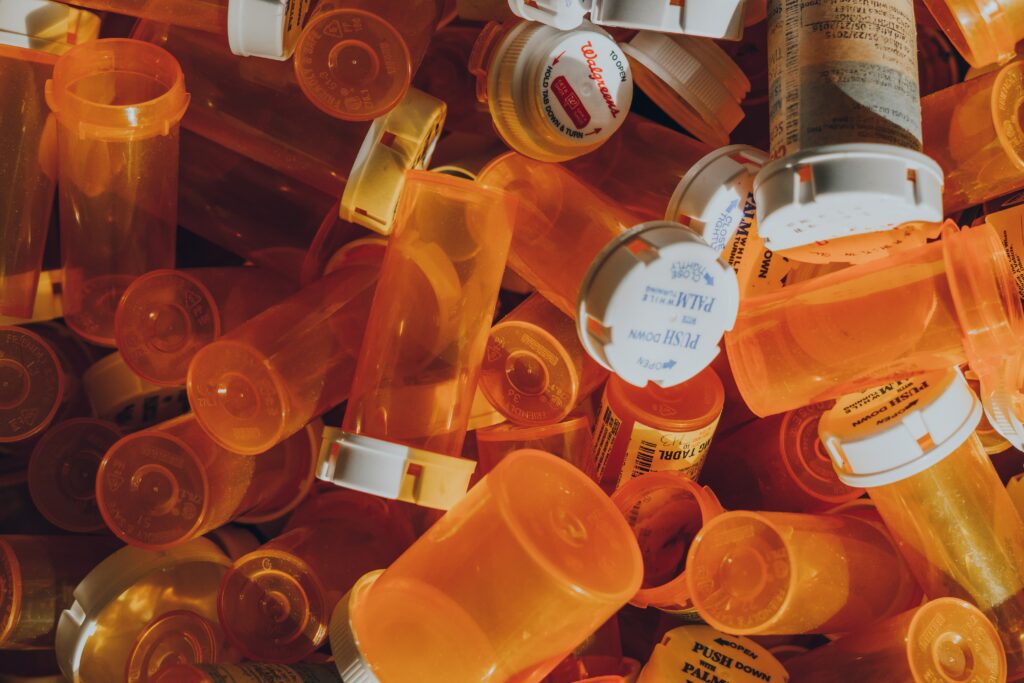Mixing Prescription Drugs and Alcohol
Mixing prescription drugs with alcohol can have serious consequences, triggering nausea, vomiting, headaches, drowsiness, and loss of coordination. Beyond this, mixing prescription drugs with alcohol can be dangerous because it increases the risk of internal bleeding, heart problems, and breathing difficulties. Alcohol may also make medications less effective or even harmful to your body.
This guide explores the dangers of combining alcohol and prescription drugs, highlights which medications to avoid mixing with alcohol, and shows you how to connect with treatment if you have been mixing alcohol with medication to detrimental effect.
Effects of Mixing Prescription Drugs with Alcohol
Mixing alcohol with certain prescription drugs can have dangerous consequences, as alcohol can alter the effects of these medications and make them harmful. Here are some commonly prescribed medications and their effects when mixed with alcohol:
- Benzodiazepines
- Opioid Painkillers
- Antidepressants
- Prescription Stimulants
- Antipsychotics
Benzodiazepines
Benzodiazepines like Valium and Xanax are fast-acting anti-anxiety medications that act on the brain’s GABA receptors. Mixing benzodiazepines with alcohol is extremely dangerous, as both substances affect the same areas of the brain. This practice can lead to poisoning, overdose, and even death. Increased side effects include drowsiness, dizziness, slowed breathing, impaired motor control, unusual behavior, memory problems or blackouts, and liver damage.
Opioid Painkillers
Opioid painkillers like oxycodone and hydrocodone, are highly addictive Schedule II controlled substances and dangerous on their own. Mixing these drugs with alcohol increases their sedating effects and significantly raises the risk of overdose. Even normal prescription doses of opioids combined with alcohol can lead to dangerously depressed breathing and oxygen deprivation, which can result in fatal overdose.
Antidepressants
Antidepressants, especially SSRIs (selective serotonin reuptake inhibitors), are vital for managing depression, anxiety, and related mental health conditions. Mixing antidepressants with alcohol can diminish the effectiveness of the medication, potentially leading to increased depressive or anxious feelings. It can also impair cognitive processes, cause sedation or sleepiness, and, in the case of older classes of antidepressants like MAOIs (monoamine oxidase inhibitors), result in heart damage. Mixing any antidepressant with alcohol can have dangerous effects, including dizziness, increased risk of overdose, heightened feelings of depression and suicidal ideation, impaired motor control, and liver damage.
- Sudden death caused by heart attack, stroke, or hyperthermia.
- Sudden death associated with violent incidents related to cocaine use, such as car accidents, gunshot wounds, or strangulations.
- Liver problems, such as fibrosis and toxicity, which may necessitate admission to intensive care units in hospitals.
Chronic cocaine users are at a higher risk of experiencing persistent and potentially more prolonged panic and anxiety attacks.
The presence of cocaethylene in the body exacerbates the risks and negative consequences associated with cocaine and alcohol use, emphasizing the need for caution and awareness when considering the combination of these substances.
Prescription Stimulants
Prescription stimulants like Adderall and Ritalin are commonly used to treat ADHD (attention deficit hyperactivity disorder). However, some individuals misuse these drugs for non-medical purposes, such as studying or staying awake. Mixing prescription stimulants with alcohol can have harmful effects, including drowsiness, difficulty concentrating, increased risk of heart problems, and liver damage.
Antipsychotics
Antipsychotics like Seroquel and Zyprexa are prescribed to those with conditions such as schizophrenia. People with these conditions are more likely to abuse substances, including alcohol. Mixing alcohol with antipsychotics reduces the effectiveness of the prescribed medication, potentially leading to the return of hallucinations and delusions. Additionally, antipsychotics can cause sedation and fatigue, and excessive alcohol consumption can intensify these effects.
- Sudden death caused by heart attack, stroke, or hyperthermia.
- Sudden death associated with violent incidents related to cocaine use, such as car accidents, gunshot wounds, or strangulations.
- Liver problems, such as fibrosis and toxicity, which may necessitate admission to intensive care units in hospitals.
Chronic cocaine users are at a higher risk of experiencing persistent and potentially more prolonged panic and anxiety attacks.
The presence of cocaethylene in the body exacerbates the risks and negative consequences associated with cocaine and alcohol use, emphasizing the need for caution and awareness when considering the combination of these substances.
Prescription Drugs You Should Not Mix with Alcohol
- Benzodiazepines: Xanax (alprazolam), Valium (diazepam), and Ativan (lorazepam).
- Opioids: Oxycodone, hydrocodone, heroin, and morphine.
- Sleep medications: Ambien (zolpidem), Lunesta (eszopiclone), and Sonata (zaleplon).
- Antipsychotics: Seroquel (quetiapine), Zyprexa (olanzapine), and Abilify (aripiprazole).
- Antihistamines: Benadryl (diphenhydramine) and Claritin (loratadine).
- Muscle relaxants: Flexeril (cyclobenzaprine) and Soma (carisoprodol).
- Anticonvulsants: Neurontin (gabapentin) and Lyrica (pregabalin).
- Certain antibiotics: Metronidazole, tinidazole, and linezolid.
Signs of Prescription Drug & Alcohol Abuse
Some common signs of prescription drug and alcohol abuse include:
Changes in behavior
Sudden and noticeable changes in behavior, such as increased secrecy, isolation, mood swings, or unpredictable reactions, may indicate substance abuse.
Physical symptoms
Physical signs of abuse can include bloodshot eyes, slurred speech, unsteady coordination, frequent accidents or injuries, and noticeable changes in weight or appearance.
Neglecting responsibilities
Individuals may neglect their personal, professional, or academic responsibilities as a result of their substance abuse, showing a decline in performance or attendance.
Social and interpersonal issue
Substance abuse often leads to strained relationships, conflicts with loved ones, and withdrawal from social activities or hobbies.
Seeking multiple prescriptions
Individuals may visit multiple doctors or engage in doctor shopping to obtain multiple prescriptions, indicating a potential misuse of prescription drugs.
Increased tolerance and withdrawal symptoms
Developing a tolerance to prescription drugs or experiencing withdrawal symptoms when not using alcohol or the medication can be signs of dependence or addiction.
Continued use despite negative consequences
Despite experiencing negative consequences such as health issues, legal problems, or damaged relationships, individuals may persist in using prescription drugs and alcohol.
These signs may vary depending on the specific substance being abused and individual circumstances. If you or someone you know is exhibiting signs of prescription drug and alcohol abuse, it is crucial to seek professional help and support to address the issue effectively.
Alcohol & Drug Abuse Treatment at Gratitude Lodge
Embark on a journey of healing and transformation at Gratitude Lodge, located in Southern California. Our pet-friendly rehab centers in Newport Beach and Long Beach offer comprehensive alcohol and drug abuse treatment.
Kickstart your recovery with our supervised medical detox program, ensuring a safe and effective detoxification process. Seamlessly transition into a 30-day inpatient program after detox to address the psychological component of addiction.
These programs incorporate evidence-based interventions such as medication-assisted treatment, psychotherapy, group therapy, individual counseling, family therapy, holistic therapies, and aftercare. Trust Gratitude Lodge to guide you towards lasting transformation and a brighter future. Take the first step by contacting our admissions team at 800-994-2184 and unlock the possibilities of a fulfilled life in recovery.
Following detox, transition into our inpatient treatment program. Interventions offered include medication-assisted treatment, psychotherapy, group therapy, individual counseling, family therapy, holistic therapies, and aftercare.
Trust Gratitude Lodge to support you every step of the way, as you transition from active addiction to a fulfilling life in recovery. Contact our admissions team at 800-994-2184 and embrace a new beginning today.
Mixing Prescription Drugs with Alcohol FAQs
Why is mixing prescription drugs with alcohol dangerous?
Mixing prescription drugs with alcohol can be extremely dangerous because it can amplify the effects of both substances and increase the risk of adverse reactions. Alcohol can interfere with the way medications are metabolized and can alter their effectiveness, leading to unpredictable and potentially harmful outcomes. Additionally, combining alcohol with certain medications can result in sedation, dizziness, impaired coordination, liver damage, cardiovascular complications, and other severe health risks.
Which medications should you not mix with alcohol?
Some common medications that should generally not be mixed with alcohol include antidepressants and anti-anxiety medications, pain medications and opioids, sleep aids and sedatives, antihistamines and allergy medications, antibiotics, anticonvulsants, and mood stabilizers
How long should you wait to take medication after drinking alcohol?
The timeframe for waiting after consuming alcohol before taking medication can vary depending on the medication and individual factors. It is generally recommended to wait at least several hours after drinking alcohol before taking medication. Always follow the specific instructions provided by the prescribing healthcare professional or pharmacist, as some medications may require a longer period of time for alcohol to be fully metabolized and eliminated from the body.
Verify Your Insurance Now
End Alcohol Addiction and Start Fresh
Our Partners
WE ACCEPT MOST PPO INSURANCE
Alcohol addiction treatment should be accessible to everyone. At Gratitude Lodge, we work with most insurance plans to cover the costs of alcohol rehab.


























